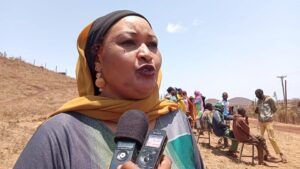
Halima Khalif one of the candidates seeking the position of MCA for Central Ward, Marsabit County | PHOTO-Correspondent
By Eastern Newspaper Correspondent,
The women in Marsabit have been urged to come out and fight for political seats this year as a way of empowering gender and participating in the social, economic, and political development of the Marsabit people.
One of the candidates seeking the position of MCA of Central Ward, Halima Khalif observed that the time has come for the women of Marsabit to challenge the men who have been holding almost all leadership positions at all levels leaving women as spectators even though the women and the majority residents of the county.
Since independence Marsabit voters have never elected a woman for the seat of the governor or senator or MP. So far no serious female contender has come out to vie for these positions in the general elections expected to be conducted this year.
According to a study carried out by Nancy Yiampoi of the University of Nairobi in 2014 to identify factors influencing women empowerment among pastoral communities, in the case of the Gabra community of Marsabit County in Kenya, it was found that gender equality and women’s empowerment, a third Millennium Development Goal is considered to be an essential component of sustainable economic growth and poverty reduction.
However, for pastoralist communities, gender inequality is acute and deep-rooted, much more so than in society at large. Women have very low social status, very low literacy levels, very restricted roles in public life, and restricted ownership of livestock (cattle and camels) the main store of wealth in pastoral economies.
The study sought to determine the influence of gender roles on women’s empowerment and establish the influence of traditional practices on women’s empowerment, as well as establish the influence of property access on women’s empowerment.
In the study, 99% of the respondents indicated that gender discrimination is the main challenge associated with gender roles, while 80 respondents with 88% had experienced GBV. The study further revealed that 84% of Marsabit women and pastoral communities turned to their husbands for permission to access a property.
From this study, there is a need to promote gender equality among pastoral communities and sensitize communities against gender discriminating traditional practices and violence against women.




